Politics
Japan, China Diplomatic Tensions Rise Over Taiwan Comments

BEIJING, China — Japan is trying to ease rising tensions with China over comments made by Prime Minister Sanae Takaichi regarding Taiwan, which have prompted Beijing to advise its citizens against traveling to Japan. The conflict started when Takaichi stated on November 7 that a Chinese attack on Taiwan threatening Japan’s survival could invoke a military response.
Japan’s Foreign Ministry’s director general, Masaaki Kanai, has planned a meeting with his Chinese counterpart, Liu Jinsong, in Beijing this week. Reports suggest Kanai will clarify that Takaichi’s remarks do not indicate a change in Japan’s security policy and will ask China to avoid exacerbating the situation.
“Various channels of communication are open,” said Japan’s Chief Cabinet Secretary Minoru Kihara during a regular press briefing. He noted that China’s travel advisory contradicts efforts to maintain a strategic, mutually beneficial relationship.
Takaichi may also have an opportunity to speak with Chinese Premier Li Qiang later this week at the G20 summit in South Africa. During a press conference, Taiwan President Lai Ching-te accused China of conducting a “multifaceted attack” on Japan, urging the international community to monitor the situation closely.
The tensions grew after Takaichi’s comments, which surfaced soon after a meeting with Chinese President Xi Jinping, where they had previously discussed pursuing stable relations. On November 8, China’s Consul General in Osaka, Xue Jian, made a controversial comment on social media that was interpreted as a threat against Takaichi.
Japan reacted by summoning China’s ambassador in protest. Meanwhile, China’s foreign ministry has expressed severe disapproval of Takaichi’s statements, emphasizing that Taiwan is a domestic issue for China.
As the situation escalates, recent Chinese military maneuvers include coast guard ships operating around disputed islands in the East China Sea, which Japan claims as its own. The tension has raised economic concerns in Japan, with experts warning that reduced tourism could severely impact Japan’s economy.
“A decrease in visitors at the level seen during the 2012 island dispute could significantly dampen Japan’s annual growth,” warned Takahide Kiuchi, an economist at Nomura Research Institute. The market has already shown signs of reacting, with shares in major Japanese companies declining in response to the tensions.
China’s state media criticized Takaichi’s comments, framing them as reckless and provocative. The historical context of animosity between the two countries adds a layer of complexity to the current situation, as both nations continue to navigate their diplomatic relationships.












